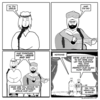Hackett C, Stonawski M, Potančoková M, Grim BJ, Skirbekk V. The future size of religiously affiliated and unaffiliated populations. Demographic Research 2015;32(27):829-42. http://www.demographic-research.org/volumes/vol32/27/
Background: People who are religiously unaffiliated (including self-identifying atheists and agnostics, as well as those who say their religion is "nothing in particular") made up 16.4% of the world's population in 2010.
Unaffiliated populations have been growing in North America and Europe, leading some to expect that this group will grow as a share of the world's population.
However, such forecasts overlook the impact of demographic factors, such as fertility and the large, aging unaffiliated population in Asia.
Objective: We project the future size of religiously affiliated and unaffiliated populations around the world.
Methods: We use multistate cohort-component methods to project the size of religiously affiliated and unaffiliated populations. Projection inputs such as religious composition, differential fertility, and age structure data, as well as religious switching patterns, are based on the best available census and survey data for each country. This research is based on an analysis of more than 2,500 data sources.
Results: Taking demographic factors into account, we project that the unaffiliated will make up 13.2% of the world’s population in 2050. The median age of religiously affiliated women is six years younger than unaffiliated women. The 2010-15 Total Fertility Rate for those with a religious affiliation is 2.59 children per woman, nearly a full child higher than the rate for the unaffiliated (1.65 children per woman).
Conclusions: The religiously unaffiliated are projected to decline as a share of the world's population in the decades ahead because their net growth through religious switching will be more than offset by higher childbearing among the younger affiliated population.
Background: People who are religiously unaffiliated (including self-identifying atheists and agnostics, as well as those who say their religion is "nothing in particular") made up 16.4% of the world's population in 2010.
Unaffiliated populations have been growing in North America and Europe, leading some to expect that this group will grow as a share of the world's population.
However, such forecasts overlook the impact of demographic factors, such as fertility and the large, aging unaffiliated population in Asia.
Objective: We project the future size of religiously affiliated and unaffiliated populations around the world.
Methods: We use multistate cohort-component methods to project the size of religiously affiliated and unaffiliated populations. Projection inputs such as religious composition, differential fertility, and age structure data, as well as religious switching patterns, are based on the best available census and survey data for each country. This research is based on an analysis of more than 2,500 data sources.
Results: Taking demographic factors into account, we project that the unaffiliated will make up 13.2% of the world’s population in 2050. The median age of religiously affiliated women is six years younger than unaffiliated women. The 2010-15 Total Fertility Rate for those with a religious affiliation is 2.59 children per woman, nearly a full child higher than the rate for the unaffiliated (1.65 children per woman).
Conclusions: The religiously unaffiliated are projected to decline as a share of the world's population in the decades ahead because their net growth through religious switching will be more than offset by higher childbearing among the younger affiliated population.









